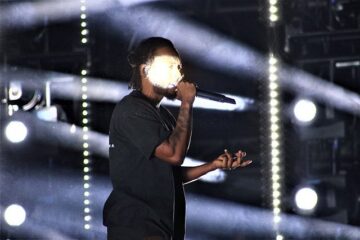Austin McCoy at Public Books:
 For a weekend in May, rap artists Drake and Kendrick Lamar ignited a fierce battle that engulfed popular culture. Lamar struck first. On Future and Metro Boomin’s “Like That,” Lamar set the stage for a relentless exchange of songs and disses between Drake, Kendrick Lamar, J-Cole, and Rick Ross. Drake responded with “Push Ups” and the controversial “Taylor Made Freestyle,” where the rapper utilized verses from AI renditions of Tupac Shakur and Snoop Dogg. Nearly two weeks later, Lamar responded to Drake with “Euphoria” and “6:16 in LA.” From there, the two rappers exchanged disses—Lamar dropped “Meet the Grahams” minutes after Drake’s response to “Euphoria” and “6:16 in LA,” “Family Matters.” Lamar punctuated the beef with the scathing and catchy viral track “Not Like Us.”
For a weekend in May, rap artists Drake and Kendrick Lamar ignited a fierce battle that engulfed popular culture. Lamar struck first. On Future and Metro Boomin’s “Like That,” Lamar set the stage for a relentless exchange of songs and disses between Drake, Kendrick Lamar, J-Cole, and Rick Ross. Drake responded with “Push Ups” and the controversial “Taylor Made Freestyle,” where the rapper utilized verses from AI renditions of Tupac Shakur and Snoop Dogg. Nearly two weeks later, Lamar responded to Drake with “Euphoria” and “6:16 in LA.” From there, the two rappers exchanged disses—Lamar dropped “Meet the Grahams” minutes after Drake’s response to “Euphoria” and “6:16 in LA,” “Family Matters.” Lamar punctuated the beef with the scathing and catchy viral track “Not Like Us.”
The battle became a rare moment of monocultural spectacle. Suddenly, everyone seemed to weigh in on television, podcasts, and social media, whether through commenting, appropriating, explaining, or chastising. Pop singer Dua Lipa appeared on the May 4 episode of Saturday Night Live, just hours after Drake and Lamar exchanged disses, to explain the beef. Ubiquitous sports journalist Stephen A. Smith took to his podcast to register his disapproval of the two artists taking the conflict too far and urged them to cease the battle. The Biden-Harris social media team even used Lamar’s lyrics from “Euphoria” to mock former President Donald Trump.
The Drake–Kendrick battle also became a stage for analyzing the politics of hip-hop beefs and litigating their cultural work in our contemporary moment.
More here.
Enjoying the content on 3QD? Help keep us going by donating now.
